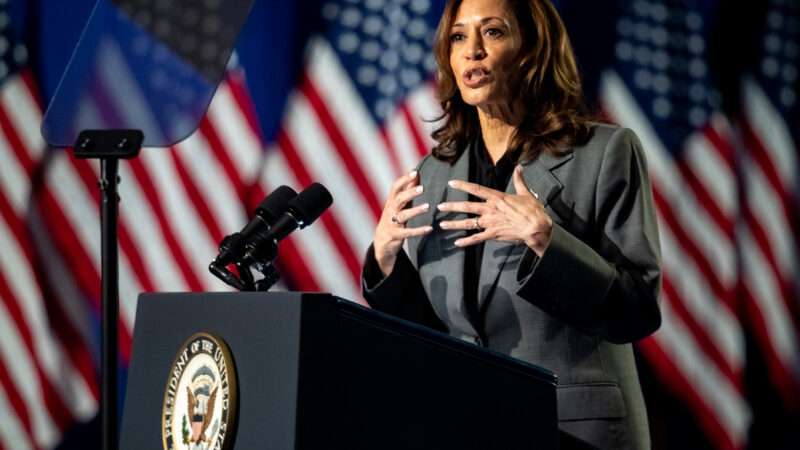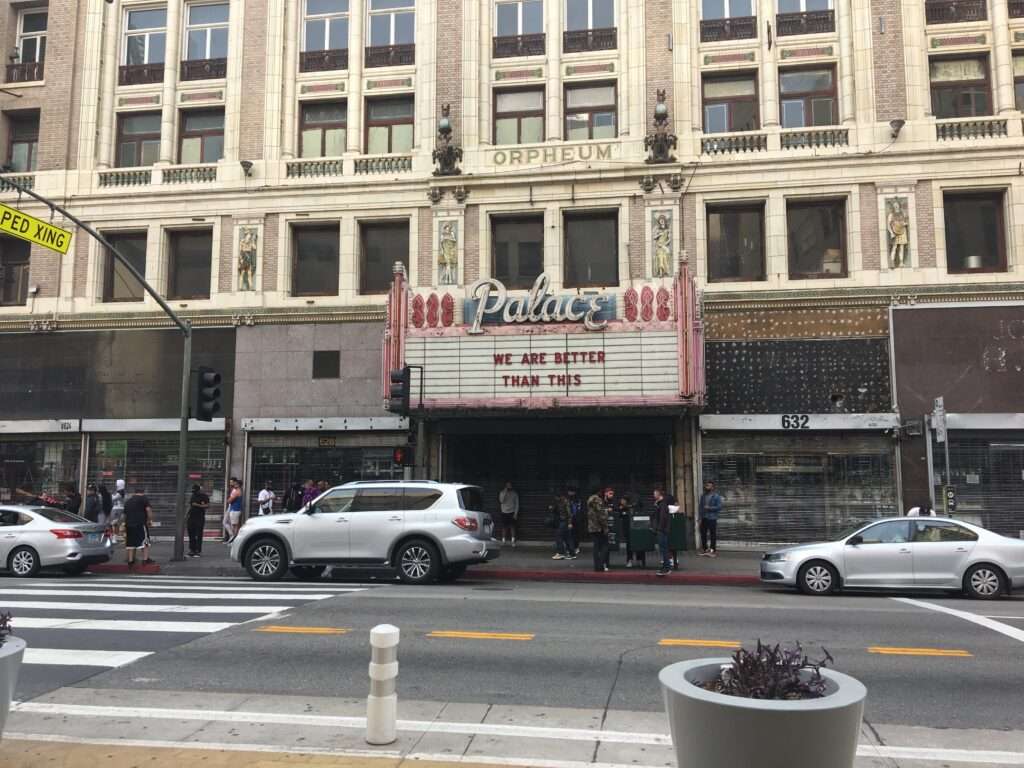
Democratic presidential nominee Kamala Harris won't say if she supports the decriminalization of prostitution, per Axios. I don't think there's much mystery here—Harris has a long history of being antagonistic toward sex workers and anything that enables sex work. But asked during her 2019 presidential bid whether sex work should be decriminalized, Harris said: "I think so, I do."
Harris' seeming flip-flop on sex work is what led Axios' Alex Thompson to try pinning down her current position. "It's among several progressive stances Harris has either abandoned or gone silent on as she's moved toward the center in her abbreviated race for the White House," he writes.
The truth, however, is that Harris has never really supported decriminalizing prostitution. Even when you look at her full statements about the matter from 2019, it's clear that she still favored punishing prostitution customers. She had just adopted a "Nordic model" stance, in which sex workers are treated as victims (and thus able to avoid arrest for selling sex alone) but anyone who offers to pay them is still criminally culpable.
For today's newsletter, let's take a look back at some of Harris' historic statements and actions related to sex work.
May–June 2004: With Harris as district attorney, San Francisco cops start cracking down on prostitution at strip clubs by stepping up raids, undercover operations, and arrests. ("The attention is a departure from former District Attorney Terence Hallinan," noted The San Francisco Examiner.) District Attorney Harris "is worried about the exploitation of women—that is a top concern of hers," a spokesperson told The Examiner in May. "She wants to make sure she talks to the dancers and has a full understanding of their concerns, but also wants to see that no laws are broken." Harris eventually declined to bring charges against arrested dancers, saying her office was developing a more "coordinated and comprehensive approach" and convening a working group to look into "potential violations of municipal, building, and penal codes" by the clubs.
January 2005: Harris said she "support[ed] and agree[d] with the spirit" of legislation to impound the cars of people convinced of soliciting prostitution, since it was about holding "accountable the true perpetrators of prostitution—the Johns, the pimps and the traffickers." ("John" is an old-timey slang for sex work clients that cops still love to use.)
2007–2009: Harris and Gavin Newsom, then San Francisco mayor, team up to shut down massage parlors where prostitution takes place. The crackdown led to shutting down"36 massage parlors that were fronts for prostitution" in the last three years, Newsom told the Associated Press in January 2010.
2008: Harris panned a San Francisco ballot initiative (Proposition K) that would have decriminalized prostitution and directed for policing prostitution into public health services instead. "I think it's completely ridiculous, just in case there's any ambiguity about my position," Harris, then district attorney of San Francisco, said. "It would put a welcome mat out for pimps and prostitutes to come on into San Francisco." While sex worker rights advocates like Carol Leigh were pushing Proposition K as a matter of protecting the safety of women in sex work, Harris complained that prostitution "compromises the quality of life in a community."
2012: Harris started targeting the online classified ad platform Backpage over its section that allows ads for escorts, strippers, and other types of "adult" work. "Backpage.com needs to shut itself down," said then-Attorney General of California Harris, calling its business model "the profiting off of selling human beings and the purchase of human beings."
May 2015: A federal lawsuit filed by the Erotic Service Provider Legal, Educational and Research Project (ESPLERP) sought to decriminalize prostitution in California. "ESPLERP's suit argues that California's prostitution statute violates both our right to privacy and our freedom of speech," LA Weekly reported at the time. Harris' office filed a motion to dismiss the case, arguing that criminalizing prostitution was necessary to deter "human trafficking and coercion, violence against prostitutes, the spread of AIDS and venereal disease, and crimes incidental to prostitution," as well as the "commodification of sex." Harris' motion made clear that criminalizing sex work wasn't just about preventing allegedly associating harms but upholding a certain moral view of sexual relations, citing a case arguing "that restrictions on prostitution are driven by 'an objection to their inherent commodifying tendencies – to the buying and selling of things and activities integral to a robust conception of personhood.'" The motion also mocked the idea that sex work could be a protected form of expressive association, quipping that "prostitutes are not hired for their conversational skills." And it argued that people have no personal right to use their bodies as they see fit, stating that there is no "property interest in working as a prostitute.…Nor is there a protectable liberty interest in employment as a prostitute."
2016: Harris' office declined to intervene in or investigate a corruption and sexual misconduct scandal involving several Bay Area police departments. Officers were accused of having relationships with an underage girl, extorting sex from her, tipping her off to prostitution stings, and covering up for one another.
Around the same time, Harris' office pushed a program to get truck drivers to report prostitution at truck stops, under the auspices of fighting human trafficking.
This was also the year that Harris really went after Backpage. In October, while running for a seat in the U.S. Senate, Harris filed pimping charges against Backpage CEO Carl Ferrer and Backpage co-founders Michael Lacey and James Larkin, alleging that because Backpage provided a forum for escorts to advertise and ads for escorting (which is legal) led to the exchange of sex for money (which is not), Backpage was guilty of illegally profiting off of prostitution. A judge dismissed the case.
In December 2016, Harris once again filed pimping charges against Ferrer, Lacey, and Larkin. A judge once again tossed the charges.
November 2017: Harris co-sponsors the Stop Enabling Sex Traffickers Act (SESTA), the Senate version of a House bill (FOSTA) that would eventually become law and target online advertising for sex work.
2019: Harris told The Root in February that "we should really consider that we can't criminalize consensual behavior" and says she thinks prostitution should be decriminalized. However, she also adds that "we have to understand though that it is not as simple as that" and points out that as San Francisco district attorney, she supported stepping up the targeting of johns.
Asked about sex work decriminalization during a CNN town hall in April 2019, Harris said that she doesn't support "criminalizing these women" but she would still target johns.
Today?
Whether Harris' position on sex work has changed since 2019 is anyone's guess. But going on the bulk of the evidence, I think it's safe to say that Harris does not take a "sex work is work" stance—that is, a stance rooted in the ideas that sex workers have agency and bodily autonomy and that decriminalization is a labor matter, in which sex workers need rights, not rescue. It seems pretty clear that in Harris' view, sex workers are largely victims in need of government protection. They shouldn't be arrested for the same reason you wouldn't arrest rape victims, but she seems to think that entities enabling prostitution—be they customers or massage parlors or tech companies—deserve to be treated like criminals.
Some people view this as a liberal or compassionate stance. But it's a world in which almost all of the harms of criminalization would still exist. Sex workers still couldn't advertise and screen clients openly, still couldn't work together for protection, still couldn't employ bouncers or other people that could help keep them safe, and so on.
The bottom line is that supporting a system in which prostitution customers are still criminalized is not supporting decriminalization. Harris has never publicly supported decriminalization, so I don't think we actually need any answers from her campaign to know where she stands now.
More Sex & Tech News
• A guide to 2024 ballot initiatives related to abortion. Voters in six states this fall will vote on abortion rights measures.
• A diverse coalition of voices is speaking out against age verification laws. In Teen Vogue, Aliya Bhatia and Ariana Aboulafia argue that such proposals would be bad for young people with disabilities. Meanwhile, the Internet Society's Christine Runner and Dan York make the case that "such laws would introduce accessibility, privacy, and security risks for users of all ages. They would also have a chilling effect on everyday Internet use to access health and entertainment content." And in an amicus brief* filed with the Supreme Court Free Speech Coalition v. Paxton, the Woodhull Freedom Foundation, Electronic Frontier Foundation (EFF), and TechFreedom write that laws like Texas's age verification law for adult content "impermissibly block adults from content they have a First Amendment right to access, burden their First Amendment right to browse the internet anonymously, and chill data security- and privacy-minded individuals who are justifiably leery of disclosing intensely personal information to online services."
Today's Image

* CORRECTION: The original version of this article erroneously listed The Wikimedia Foundation as part of the amicus brief.
The post A History of Harris Positions on Sex Work appeared first on Reason.com.







